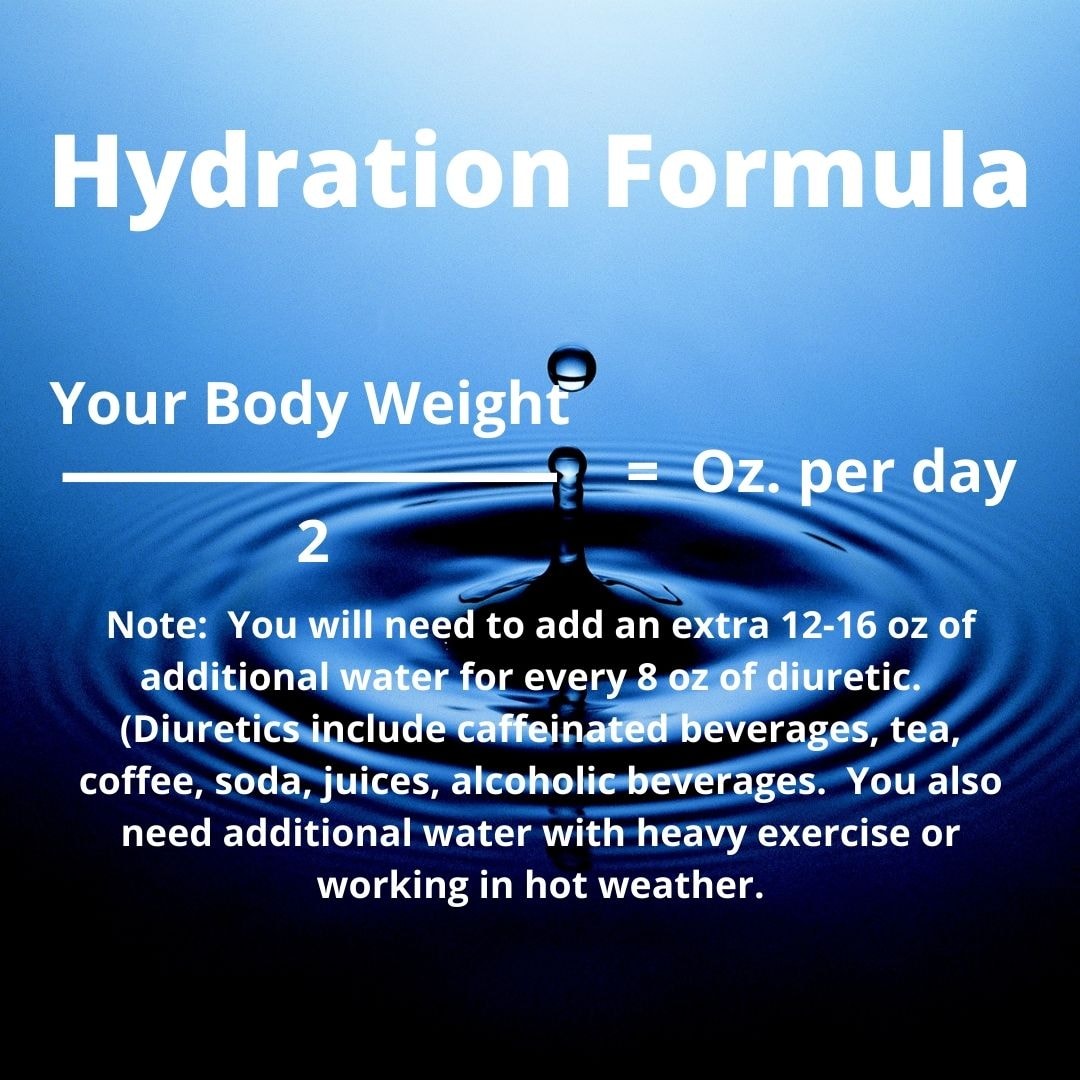
Nourishing Your Body, Renewing Your Life
Welcome to Your Renewable Life

What You Need To Know About Hydration

When I work with clients, I start with some general questions about their hydration status.
“How much plain water do you estimate drinking per day?
What other beverages do you drink and how much?
Did you know that water is the most common nutritional deficiency in the U.S.?
Think about that for a minute. We are a first-world country with access to as much water as we can drink and yet it is the most common deficiency in our diet.
There is a basic general equation to figure out the amount of water you need per day, generally speaking. Of course, your activity level, any medications, stress, and consumption of other beverages play a factor in your own unique hydration needs.
The formula goes like this:
Take your body weight divided by 2 to get the number of ounces you should be drinking daily. This is the simplest answer. If you work in the heat or at a job that requires physical exertion or you work out intensely and frequently you will need to add more water. Also, if you drink caffeinated beverages (coffee, tea, soda), juices or alcoholic beverages, it is a good measure to drink an extra 12-16 oz for every ounce of one of these beverages. This is because these beverages are direct and prompt fluid loss from your body.

Now the whys –
1. If your body’s fluid level is just 2% below its optimal needs, you will experience on or more of the following: fatigue, anxiety, irritability, depression, cravings, cramps, and headaches.
2. If you ignore the fatigue and let your dehydration reach up to 10% you will experience more severe health problems with your heart, immune system, and digestive system to name a few. Specific symptoms of mature dehydration include heartburn, joint pain, back pain, migraines, fibromyalgia, constipation, or colitis. Greater than 10% is deadly.

A word of caution on soft drinks, regular or diet makes no difference. It has no nutritional value. Caffeine is a diuretic which means you are going to have to drink extra water to make up for it. (This is the case for all caffeinated beverages!) Sugar or artificial sweeteners are both problems for blood sugar management and a host of other harms to your entire system. Then, there is phosphoric acid in carbonated beverages. The amount of phosphoric acid in soft drinks hurts stomach acid production – so it affects your digestion – and in excess can hurt your body’s ability to uptake calcium properly, which can contribute to conditions like osteoporosis, arthritis, bone spurs, and so on.
To further drive home how important water is for you and for me, check out the research.
The elderly are more likely to become dehydrated due to lower fluid intake from lack of thirst. Small changes in thirst receptors as we age seem to be a likely culprit of this. I see this in my own 75-year-old mother. She says she drinks “lots and lots” of water. And that she can’t drink any more than she already is. Since her cup is filled with ice, I know she wasn’t getting more than 50 oz or so per day. Now we have a goal for her to get about 75 oz per day according to the formula above.
InThe Hydration Equation: Update on Water Balance and Cognitive Performance (Riebl and Davy, 2017) it is reported that cognitive performance is markedly reduced with varying levels of dehydration. While it is known that a 2% water loss in the body shows fatigue and cognitive decline, this article refers to additional studies that found mental impairment even sooner, at just 1-2%. I found cognitive testing to check for dehydration fascinating and have made a note to study these resources for testing further. During functional evaluations with clients, we can LNT (lingual-neuro test) water and/or mineral salt to assess the body’s hydration status.
The 3rd point I would like to highlight relates to how you really need to check out a study for yourself rather than just taking a media headline and trusting it. I found a perfect example here –No Evidence of Dehydration with Moderate Daily Coffee Intake: A Counterbalanced Cross-Over Study in a Free-Living Population(Killer, Blannin, Jeukendrup 2014). Reviewing the actual study instead of just the headline really exposes the bias of the researchers and how predominant this issue is.
When you cross-reference the headline with Table 1, Page 2 of this study, it is clear that they contradict each other 7 out of the 13 rows had a diuretic result. If you don’t replace the fluid from a diuretic, the result is overall water loss (aka dehydration) however mild.
The public becomes so brainwashed to these studies as they come into public media and very rarely look at the facts within the study. In reality, the studies aren’t written for laypeople to understand, which is another issue that we as nutrition and wellness advocates have to battle when trying to reach our clients and the people we come in contact with.
If you have any questions about the information presented here, or you would like to learn if you are adequately hydrated, I’d love to hear from you. Send me a message.
Resources:
Get the Facts: Drinking Water and Intake (CDC 2017)
Water, Hydration and Health (Popkin, D’Anci, and Rosenberg 2010)
The Hydration Equation: Update on Water Balance and Cognitive Performance (Riebl and Davy, 2017)



